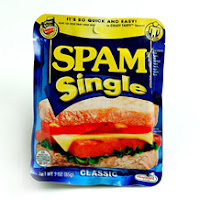I'm really jazzed by some apparently awesome news from Amazon this week, which came on the same day that I announced my impending move to professional freedom. If you didn't see it, the online bookseller announced something called Amazon Singles - don't think Kraft Singles or even Spam Singles, but rather the sort of "singles" released by musicians.
Amazon Singles are a sort of e-book, but not really an e-book. As the company describes it, a Single is somewhere in between - it ranges from 10,000 to 30,000 words (or 30 to 90 pages), which makes it "twice the length of a New Yorker feature or as much as a few chapters of a typical book." As the nomenclature implies, an Amazon Single is to a book what an individual song is to an album.
Amazon is going to introduce Singles as a separate category in its Kindle store, and they will be priced "much less than a typical book." The announcement is "a call to serious writers, thinkers, scientists, business leaders, historians, politicians and publishers to join Amazon in making such works available to readers around the world."
As the company puts it, Singles are intended as the perfect way "to lay out a single killer idea, well researched, well argued and well illustrated - whether it's a business lesson, a political point of view, a scientific argument, or a beautifully crafted essay on a current event."
Perhaps the most interesting part of the announcement is how written works will get into the Singles store: writers will submit them to Amazon, which will then judge them.
That raises a lot of questions, and it could be a really good thing - or a less good thing. The main questions are what sort of criteria will Amazon apply to judging what gets in and what doesn't, and will actual employees read the submissions to make determinations? I asked Amazon and so far, they ain't talking.
If humans judge submissions, the quality level of Singles would, presumingly, be fairly high. However, I doubt humans will be in control, for a couple of reasons.
Doing so would bring up something called "scalability," which is techno-jargon for being able to automate things. For a good explanation of the term, you may want to check out by Randall Stross. In his book, Stross explains why Google was able to leapfrog over Yahoo as the world's pre-eminent search engine. The secret lays in scalability - in its early days, Yahoo had humans manually compiling the search results you'd get when you used its engine. Google figured out a way to have computer algorithms do that, which meant it could easily handle billions of searches a second. Yahoo's humans, of course, couldn't match that kind of volume.
The same is likely to hold true with Amazon's Singles. While the company could easily handle a small load of submissions, ultimately it won't be able to deal with the increases in volume that will come if the service proves popular. My suspicion is that algorithms will scan submissions and flag any that contain hate speech or other undesirable stuff, which would then be read by humans. Otherwise, though, just about everything is likely to get approved for sale.
Again, there's no way to be sure yet as Amazon isn't divulging, but there's another reason why I don't think humans will be the judges. Singles seems to be somewhat of an FU to book publishers, with whom Amazon has had a less than smooth relationship. Like an old married couple, Amazon and publishers are continually bickering - in their case, about pricing (especially e-book pricing).
Singles, like Amazon's , seems to be a call to the writers who get jerked around by publishers to bypass those self-same gatekeepers. It seems pretty unlikely then that Amazon would go and do the same sort of gate-keeping with some self-imposed publication standards.
Amazon also hasn't said how pricing and payment of Singles will work, which leaves us to presume it'll probably be the same as self-published books - authors get 70% of whatever they charge, while Amazon gets 30%.
Ultimately, the human-algorithm dichotomy is a bit of a double-edged sword. If humans end up acting as gatekeepers to the Singles store, Amazon will turn itself into a de facto publisher; it will be using its own brand as a stamp of approval, and writers who get in will benefit from it. On the other hand, if algorithms are in charge and everyone is allowed in, then writing is greatly democratized, the downside of which is that writers must then do their own promotion. For writers who aren't afraid to do that (myself included), that's not necessarily a bad thing.
I'm anxious to have these questions answered but at this point, Singles seem to be music to my newly independent-writer ears. Amazon would have to come out with some pretty crappy terms for me to not give this service a try when it goes live.

0 comments:
Post a Comment